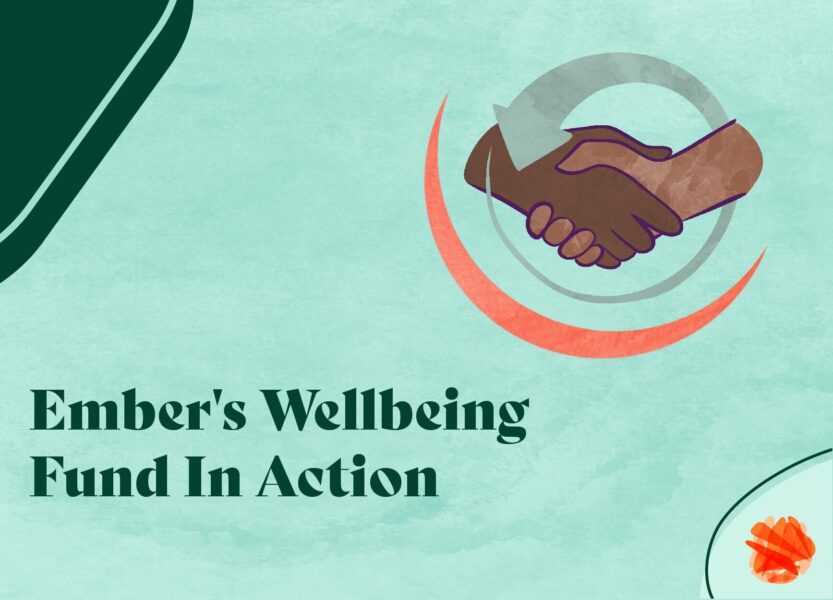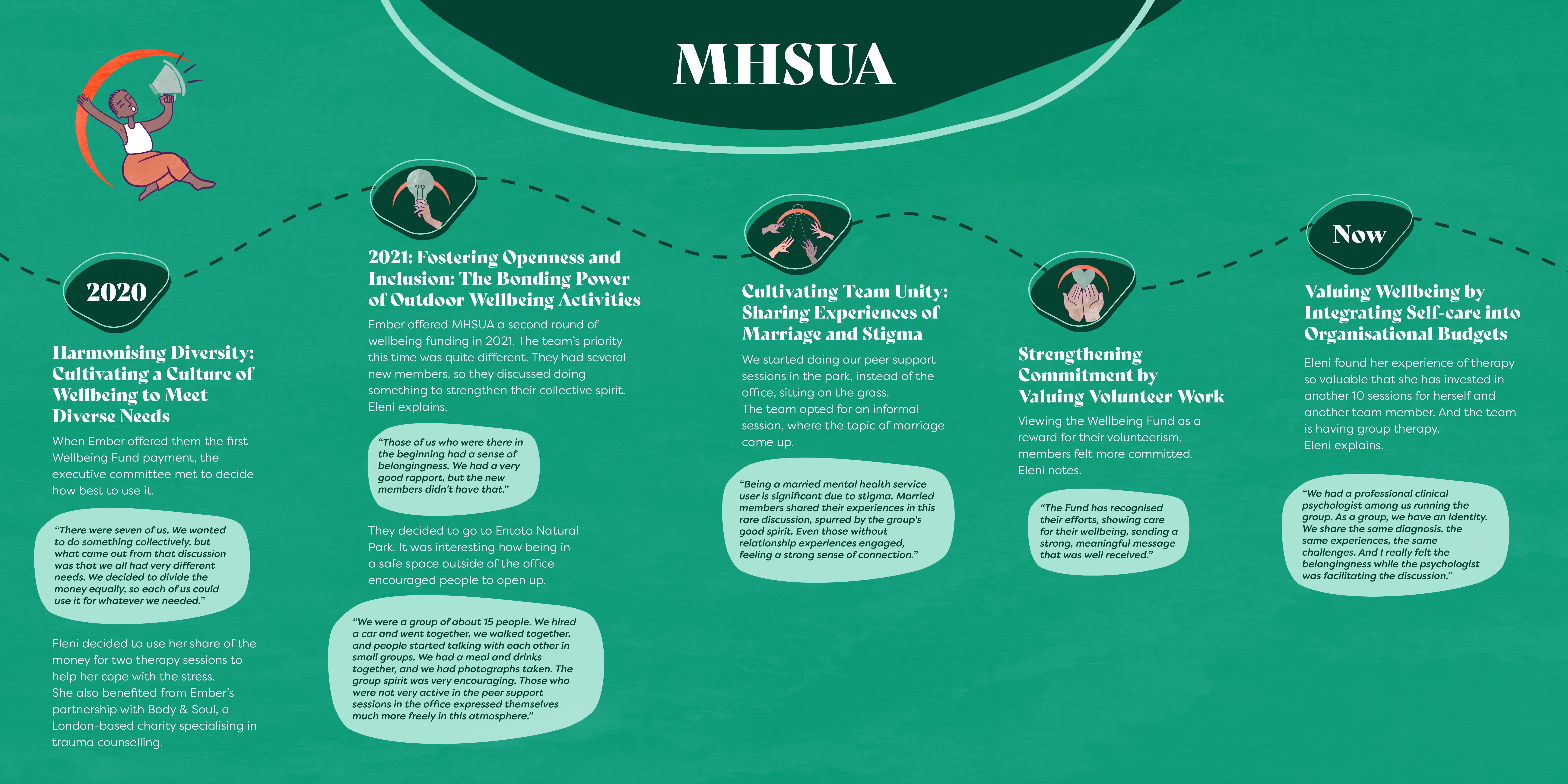Sowing Seeds of Self-Care: Ember's Wellbeing Fund in Action
Mar 05, 2024

This article delves into the significant impact the Ember Wellbeing Fund has had on two partner innovators- Mental Health Service Users’ Association (MHSUA) and Global Mental Health Peer Network (GMHPN) , as narrated directly by the organisations themselves. Their journeys have been beautifully written by Belinda Cooper and Dr Vittorio Sandri.
The Care Paradox and Ember Wellbeing Fund
Despite their training and expertise in supporting others, mental health carers are not immune to their own struggles and challenges. The nature of their work often involves empathising deeply with others and being exposed to clients’ distressing experiences, which can take a toll on their own mental and emotional wellbeing.
Yet mental health workers often lack adequate support systems for their own wellbeing, which not only presents a paradoxical situation but also undermines impact and sustainability. The effectiveness of teams and the impact of organisations are not solely determined by financial resources but also by the overall wellbeing of those involved. Without proper safeguarding and promotion of wellbeing, a sustainable and impactful workforce cannot be achieved.
In response to this situation, we have established a dedicated Ember Wellbeing Fund. This initiative allocates a pot of money each year to help support the health and wellbeing of the teams we work with. Each team is free to spend it in a way that works well for them. In addition, our partners have access to an array of customised support initiatives, which may encompass team-building activities, social events, one-to-one therapy, and art therapy among other activities.
With this funding, we aim not only to support our innovators but also to encourage them to reflect on their own wellbeing and make them feel that their wellbeing is important and valued by others. For once, they are not the carers, but the cared for. Here, two of Ember's innovators share their experience of the Wellbeing Fund and what it has meant for them.
Empowering Resilience and Wellbeing: MHSUA's Journey of Advocacy
The nature of our membership is that we all live with mental health challenges. If we are not purposefully investing in our wellbeing, our work could become stuck. There should be a balance between the work we do and taking care of ourselves.
Eleni is President of the Mental Health Service Users’ Association (MHSUA), an association of mental health care users in Ethiopia. It focuses on mental health advocacy and policy interventions, awareness-raising and peer support. Founded in 2018, it is run by people with mental health lived experience. Supported by members and volunteers, MHSUA has two members of staff working alongside Eleni in the Addis Ababa office.
For Eleni and her team, the launch of the Wellbeing Fund was very timely. Ember had started working with MHSUA in 2020, and then the pandemic hit. At that point, Eleni was running MHSUA whilst also working full-time for the International Rescue Committee. She was working all hours of the day, and it was taking its toll. ‘It was a very difficult time,’ she remembers. ‘The pandemic, the quarantine, the mental health pressure and financial strain that we were going through. I was very stressed.’ It was also a difficult time for her team members.

Embedding Wellbeing in the Future of MHSUA
Recognising the value and impact of wellbeing initiatives, Eleni is determined to continue integrating wellbeing into MHSUA's strategies, ensuring that both the team’s collective health and individual needs are addressed for sustainable growth and effectiveness. ‘When we apply for funding, when we write proposals, we are consciously bringing that into the budget’, she says. ‘We are planning for group activities and personal wellbeing, because I have seen from my own experience that it works well. It is instrumental in bringing the best out of me.’
Global Collaboration, Individual Care: Journey of GMHPN in Enhancing Team Wellbeing and Peer Support
I'll never forget the first time we met with Ember. We told them what we do, and they asked us how we weren’t losing our minds. They said that we needed to be more focused on our wellbeing. We're serving a whole bunch of people, the public and all these stakeholders, but we're important too. That was two years ago, and it's just not left me. It's something that will stay with me forever.
Claudia Sartor is Deputy CEO of the Global Mental Health Peer Network (GMHPN). Founded in 2018, GMHPN is an international organisation that builds capacity among people with lived experience of a mental health condition. With a global office in Paarl, South Africa, it has 150+ advocates across 38 countries.
GMHPN started working with Ember in 2022. ‘There were just three of us at the beginning,’ explains Claudia, ‘and we were excited when we heard about the Wellbeing Fund. It was something we needed as a small group because our workload was huge. We were under immense stress to get things done.’
Their first wellbeing payment prompted an interesting conversation. ‘Giving us that stipend and trusting us to use it in the right way, we had to come to an agreement,’ Claudia remembers. ‘We asked, what does wellness mean for each of us?

The Future Challenge: Sustaining Team Wellbeing as the Organisation Expands
Claudia perceives the primary challenge in maintaining this approach as the organisation’s growth, acknowledging that expanding size could make it more difficult to manage the team’s wellbeing. ‘I think the bigger we grow, the harder it's going to be to manage the wellbeing of our team. I would envision one day perhaps having a wellness unit that directly works around that.’
‘We are also always looking for any workshops or webinars or anything that we can share with members,’ she adds. ‘Ember have asked if we would be interested in a psychologist coming in. That would be something I would prioritise for my team, to have an outlet that’s not just us. I think we still need some support at this stage and probably within the next few years to keep this going.’
The Wellbeing Fund three years on: what have we learned?
Eleni and Claudia’s stories show us that wellbeing initiatives have a significant impact on workers’ mental health.
- In both cases, relatively small amounts of funding started powerful conversations. This triggered profound and long-lasting change in how each organisation is thinking about and managing their own wellbeing.
- Both organisations saw positive ripple effects on the cohesion of their teams, and consequently, on the impact they have on the ground.
- From their experience, we learn that wellbeing comes in many different shapes and forms. It is most effective when it is tailored to the specific needs of individuals and organisations.
- We also see the power of peer group support and networks. Wellbeing initiatives make volunteers feel valued and supported and can help to overcome the stigma of mental health lived experience.
- It highlights the importance of a close relationship between funders and their investees. It is important in understanding their needs and tailoring wellbeing support effectively.
- And we see how checking in on partners and listening to their needs has a positive impact on their wellbeing and resilience. For once, they are not the carers but the cared for.
- Most of all, it highlights the importance of investment. From the perspective of funders, that means including a sum for wellbeing in donations. From the perspective of organisation leaders, including a wellbeing line in the organisations’ budget.
Read more about our philosophy of wellbeing, the principles guiding our support, and its impact on organisations in the article: Taking care of the carers